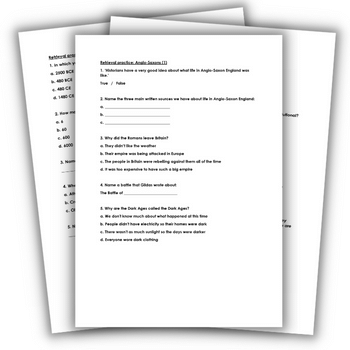Free retrieval practice activity
By using or adapting these multiple-choice retrieval practice examples by Jon Hutchinson for your own classroom, you can effectively prompt students to retrieve information from their long-term memory.
Embedding regular tests and quizzes into your timetable is a great way to help students to recall information from previous lessons. They need only take five minutes.
Display answers on the whiteboard so pupils can self-mark to save time. Or they can swap tests with their study partner.
When doing your planning, always think about the main points and key terms you want pupils to remember by the end of your session. Knowledge organisers can be helpful here.
You can then use these key points as the basis for your multiple-choice quiz at the start of your next lesson.
Benefits of retrieval practice
By beginning your lesson with a retrieval activity such as a short multiple-choice quiz, you’re creating a calm and focused start to your lesson.
You’re also effectively interrupting the ‘forgetting curve’. Even if pupils don’t get the answers right in these memory tests, they will still benefit from this powerful learning strategy.
Perfect for your next history lesson
This download features ten examples of short five-question quizzes on various aspects of history.
There are a few different types of questions included. Some are multiple choice, some are true/false and some are short-answer questions. These require pupils to write a sentence or two.
They’re a great way to help KS2 pupils to practise knowledge retrieval and boost their long-term retention of knowledge.
Topics covered in these downloadable retrieval practice examples include:
- Ancient Greece
- Anglo Saxons
- Martin Luther King
- Medieval Monarchs
- Middle East
- Prehistoric Britain
- Roman Empire
- Shang Dynasty
- Vikings
While pupils are working on their quizzes, walk around the room and note if there are common questions that are tripping children up. Use this instant feedback to plan your next steps.
Try not to include funny or obvious ‘wrong’ answers when planning your own retrieval practice activities. Children tend to focus on these, especially if they’re humorous, rather than remembering the correct information.
Also make sure that pupils don’t look back through their books to find the correct answers when taking part in retrieval practice exercises. This isn’t true retrieval of knowledge, but merely rereading.
Quizzes are just one type of effective retrieval practice. Also take a look at our free Kate Jones retrieval practice grids. This retrieval practice format encourages pupils to recall information from memory, not just recognise the correct answer.
Find out more about retrieval-based learning activities to use in your classroom.
Jon Hutchinson is the director of training and development at the Reach Foundation. Read more about how Jon uses retrieval practice in the classroom.














